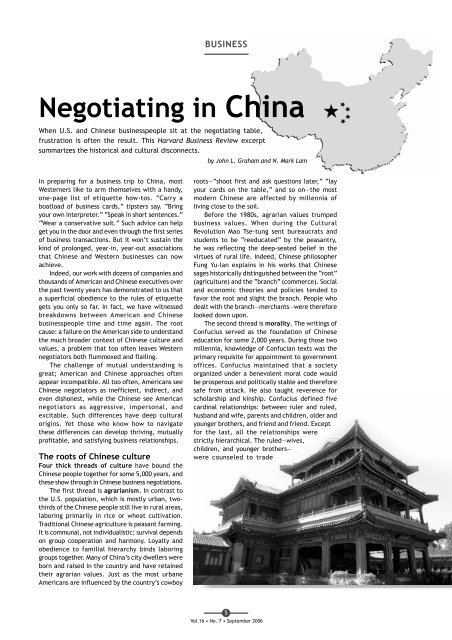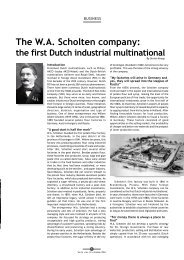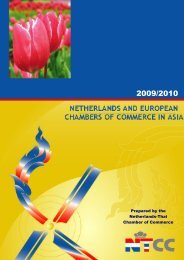Sept06 latest - Association of Dutch Businessmen
Sept06 latest - Association of Dutch Businessmen
Sept06 latest - Association of Dutch Businessmen
Create successful ePaper yourself
Turn your PDF publications into a flip-book with our unique Google optimized e-Paper software.
BUSINESS<br />
Negotiating in China<br />
When U.S. and Chinese businesspeople sit at the negotiating table,<br />
frustration is <strong>of</strong>ten the result. This Harvard Business Review excerpt<br />
summarizes the historical and cultural disconnects.<br />
by John L. Graham and N. Mark Lam<br />
In preparing for a business trip to China, most<br />
Westerners like to arm themselves with a handy,<br />
one-page list <strong>of</strong> etiquette how-tos. “Carry a<br />
boatload <strong>of</strong> business cards,” tipsters say. “Bring<br />
your own interpreter.” “Speak in short sentences.”<br />
“Wear a conservative suit.” Such advice can help<br />
get you in the door and even through the first series<br />
<strong>of</strong> business transactions. But it won’t sustain the<br />
kind <strong>of</strong> prolonged, year-in, year-out associations<br />
that Chinese and Western businesses can now<br />
achieve.<br />
Indeed, our work with dozens <strong>of</strong> companies and<br />
thousands <strong>of</strong> American and Chinese executives over<br />
the past twenty years has demonstrated to us that<br />
a superficial obedience to the rules <strong>of</strong> etiquette<br />
gets you only so far. In fact, we have witnessed<br />
breakdowns between American and Chinese<br />
businesspeople time and time again. The root<br />
cause: a failure on the American side to understand<br />
the much broader context <strong>of</strong> Chinese culture and<br />
values, a problem that too <strong>of</strong>ten leaves Western<br />
negotiators both flummoxed and flailing.<br />
The challenge <strong>of</strong> mutual understanding is<br />
great; American and Chinese approaches <strong>of</strong>ten<br />
appear incompatible. All too <strong>of</strong>ten, Americans see<br />
Chinese negotiators as inefficient, indirect, and<br />
even dishonest, while the Chinese see American<br />
negotiators as aggressive, impersonal, and<br />
excitable. Such differences have deep cultural<br />
origins. Yet those who know how to navigate<br />
these differences can develop thriving, mutually<br />
pr<strong>of</strong>itable, and satisfying business relationships.<br />
The roots <strong>of</strong> Chinese culture<br />
Four thick threads <strong>of</strong> culture have bound the<br />
Chinese people together for some 5,000 years, and<br />
these show through in Chinese business negotiations.<br />
The first thread is agrarianism. In contrast to<br />
the U.S. population, which is mostly urban, twothirds<br />
<strong>of</strong> the Chinese people still live in rural areas,<br />
laboring primarily in rice or wheat cultivation.<br />
Traditional Chinese agriculture is peasant farming.<br />
It is communal, not individualistic; survival depends<br />
on group cooperation and harmony. Loyalty and<br />
obedience to familial hierarchy binds laboring<br />
groups together. Many <strong>of</strong> China’s city dwellers were<br />
born and raised in the country and have retained<br />
their agrarian values. Just as the most urbane<br />
Americans are influenced by the country’s cowboy<br />
roots—“shoot first and ask questions later,” “lay<br />
your cards on the table,” and so on—the most<br />
modern Chinese are affected by millennia <strong>of</strong><br />
living close to the soil.<br />
Before the 1980s, agrarian values trumped<br />
business values. When during the Cultural<br />
Revolution Mao Tse-tung sent bureaucrats and<br />
students to be “reeducated” by the peasantry,<br />
he was reflecting the deep-seated belief in the<br />
virtues <strong>of</strong> rural life. Indeed, Chinese philosopher<br />
Fung Yu-lan explains in his works that Chinese<br />
sages historically distinguished between the “root”<br />
(agriculture) and the “branch” (commerce). Social<br />
and economic theories and policies tended to<br />
favor the root and slight the branch. People who<br />
dealt with the branch—merchants—were therefore<br />
looked down upon.<br />
The second thread is morality. The writings <strong>of</strong><br />
Confucius served as the foundation <strong>of</strong> Chinese<br />
education for some 2,000 years. During those two<br />
millennia, knowledge <strong>of</strong> Confucian texts was the<br />
primary requisite for appointment to government<br />
<strong>of</strong>fices. Confucius maintained that a society<br />
organized under a benevolent moral code would<br />
be prosperous and politically stable and therefore<br />
safe from attack. He also taught reverence for<br />
scholarship and kinship. Confucius defined five<br />
cardinal relationships: between ruler and ruled,<br />
husband and wife, parents and children, older and<br />
younger brothers, and friend and friend. Except<br />
for the last, all the relationships were<br />
strictly hierarchical. The ruled—wives,<br />
children, and younger brothers—<br />
were counseled to trade<br />
5<br />
Vol.16 • No. 7 • September 2006
















